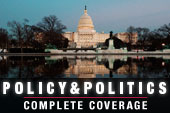As he launches his second term, President Obama is assembling a new cabinet that may be most remarkable for how unremarkable it looks.

Within the next few weeks, the small handful of prominent or truly familiar faces – such as Secretary of State Hillary Rodham Clinton, Defense Secretary Leon E. Panetta, and Treasury Secretary Timothy F. Geithner – will be gone from the scene. Lisa Jackson, the Environmental Protection Agency administrator and first African-American woman to hold that position, as well as Secretary of Labor Hilda Solis, a Latina, also announced they would be departing the administration soon.
For sure, the president has added some luster to his cabinet with his choice of John F. Kerry, the Massachusetts senator and one-time Democratic presidential nominee, to succeed Hillary Clinton at the State Department. Two other prominent women, Health and Human Services Secretary Kathleen Sebelius and Homeland Security Secretary Janet Napolitano, will also be staying on.
But the new lineup of department and agency heads and top advisors will be dominated by seasoned professionals – all white men – including many with strong personal ties to the president.
White House chief of staff and former budget director Jack Lew will succeed Geithner at Treasury. Deputy National Security Advisor Denis McDonough is slotted to assume Lew’s chief of staff post. Counterterrorism and homeland security advisor John Brennan will replace disgraced Gen. David Petraeus as CIA director. And former senator Chuck Hagel, R-Neb., a decorated Vietnam War veteran who was close to Obama in the Senate, will take the reins of the Pentagon – provided he survives what’s expected to be a tough Senate confirmation hearing.
Few could challenge the credentials of these top picks. Yet Obama, the first African-American president, has been criticized for choosing a new cabinet heavy on white guys while bypassing qualified women and minorities.
“I think they should find the most qualified person possible, and luckily there are a lot of women and people of color who are qualified,” said Paul Light, a professor of government and public service at New York University. “But Obama has given away the big presents to the white guys . . . It reflects to me a lack of conscious concern for the issue.”
At his final press conference of his first term earlier this month, Obama vowed that his second-term team would be diverse and urged critics not to “rush to judgment.” Just yesterday, he nominated Mary Jo White, a lawyer in private practice, to head the Securities and Exchange Commission.
RELATED: 10 Secrets About Wall Street's New Top Cop
Ursula Burns, the African-American head of Xerox Corp., and Sheryl Sandberg, chief operating officer at Facebook, are being considered for Commerce Secretary; Sylvia Mathews Burwell, president of the Wal-Mart Foundation, is being eyed for the Office of Management and Budget; and Cathy Zoi, undersecretary for energy efficiency and renewable energy at the Department of Energy, is a possible replacement for Energy Secretary Steven Chu.
But Light said that while the new administration overall may turn out to have an acceptable balance of women and minorities, “the total amount of diversity in the inner cabinet and the top decision making positions” will be far less.
Other experts think the concern is overblown. Robert Watson, a professor of American Studies at Lynn University in Boca Raton, Fla., noted that “Hagel is a Republican; Lew is Jewish; so only Kerry brings no diversity to the cabinet – and roughly 43 percent of [Obama’s] total appointments have been women.”
“Government should look a lot like the people it governs in a democracy,” Watson said. “But I do think that in some ways Obama is almost a victim of his success in that his first cabinet was so diverse – and he has so much diversity in the under, deputy-secretary levels and key administrative appointments throughout his administration.”
Others, however, argue that identity politics should never trump the appointment of a top candidate. Mediate columnist Josh Feldman wrote, “Diversity is obviously something a president should strive to maintain in government, and Jay Carney said Obama did ‘insist… on diversity”’ in his lists for potential nominees, but the absolute top priority for any president is picking individuals who they believe to be supremely qualified for the job. Diversity of race and gender should certainly be factors for any president to consider, but ultimately, they are second to having diversity of thought.”
Stephen Hess, a presidential scholar with the Brookings Institution, contends that Obama rightly is turning to experienced and well-trusted advisers to help him secure his legacy in the next couple of years. While it was important for Obama to show diversity in his appointments in his first term, the imperative in a second term is to put in place a trusted team well prepared to hit the ground running.
“He can’t afford a steep learning curve” for his top advisers, Hess told The Fiscal Times. “He knows what he must do, he knows what he would like to do, and he knows that he has a very, very short time in which to do it."





